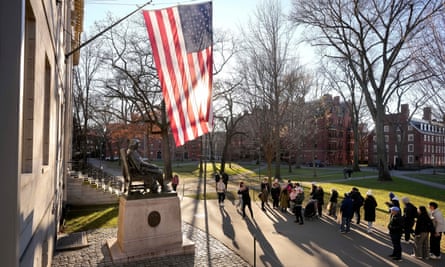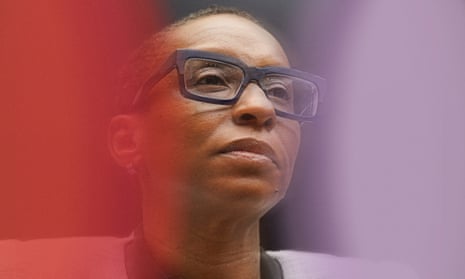Claudine Gay’s days as Harvard president may well have been numbered from the moment she appeared to equivocate on whether theoretical calls for violence against Jewish people violated Harvard’s rules while testifying before Congress last month. But it was allegations of plagiarism that ultimately led to her resignation on Wednesday.
Investigations by the Washington Free Beacon and the New York Post, at least partially instigated by the conservative activist Christopher Rufo and his crusade to chase “wokeism” and diversity initiatives from all corners of society, turned up nearly 50 instances of alleged plagiarism in Gay’s academic writing.
According to the Harvard board, a school subcommittee and independent panel charged with investigating the plagiarism allegations against Gay found “a few instances of inadequate citation” but “no violation of Harvard’s standard for research misconduct”; Gay was said to be “proactively requesting” four corrections.
No doubt, a top administrator accused of being a chronic cut-and-paster is a bad look for the nation’s foremost institution of higher education. But is what Gay did beyond the pale? Experts concede it’s a complicated issue.
“I used to call plagiarism the oldest profession,” says Barbara Glatt, a pioneering forensic plagiarism investigator who is regularly called upon to consult on high-profile cases within the academy and in publishing. It can be direct (copying something word for word without attribution), indirect (the wholesale theft of ideas), mosaic (changing some words while copying others) or even an honest mistake (an error of omission or execution) – all things Gay was accused to have done, even as she continues to stand by her scholarship.
Academic writing isn’t a breezy process that makes for easy reading – especially in college, where the rules often come down to a professor’s style preference (MLA v Chicago v AP v APA). It’s no wonder so many fall into the plagiarism trap of their own making. And while Gay more than anyone should have known better, it seems unfair that she should be the one to take the fall when her errors were missed by the institutions that published her – not least the Harvard PhD committee that awarded her the Toppan prize for the best political science dissertation in 1998.

Not even Harvard’s own board appears to have done as thorough a vetting of Gay’s bibliography before making her the college’s first Black president in 387 years, or before forcing her demotion after six months on the job. “They had a month and a half to get ahead of this scandal,” says Jonathan Bailey, a journalist and plagiarism consultant who began hearing of efforts to investigate Gay for plagiarism after her ignominious appearance on the Hill. “I also feel pretty confident that if they had started from the word go, hired an outside expert, made it a transparent process and highlighted the details, they could’ve gotten ahead of this.”
Since Gay was chased out of office, Business Insider found what it characterized as a similar pattern of plagiarism in a Harvard dissertation authored by Neri Oxman, a professor and artist married to Bill Ackman – the billionaire Harvard donor and a prominent player in the anti-Gay attack machine. (Oxman has apologized.)
‘Plagiarism fundamentalism’
When it comes to fighting plagiarism outright, few can claim as long a lead as Glatt. In the 80s, she was among the first to develop academic-focused anti-plagiarism software to suss out plagiarism in school papers. The software would take a sample of student writing, remove every fifth word – then Glatt would circle back to the suspect to fill in the blanks to determine whether the text was theirs. Back then she reckoned the transgression rates among high school and college students was between 50% and 80%. She figures the problem has only become worse since the internet came along and created “a bull market for plagiarism”, where sources and cheating services abound. In recent years AI has become as much a part of the solution as part of the problem, providing an easy means to produce work that’s not one’s own, but also for educators to cross-check for plagiarism.
It was through AI that the inconsistencies in Gay’s scholarship were found. In some works, Gay credits a source in the wrong sentence. In others, she borrows language that even those who were ostensibly plagiarized accept as common phrasing within their field of study. “I am not at all concerned about the passages,” said the political science professor David Canon, whose work the Washington Free Beacon accused Gay of plagiarizing. “This isn’t even close to an example of academic plagiarism.”
In the acknowledgments section of her political science dissertation, Gay shouts out her dissertation adviser, the esteemed social scientist Gary King, who “reminded me of the importance of getting the data right and following where they lead without fear or favor”, and paid homage to her family, who “drove me harder than I sometimes wanted to be driven”.
The Beacon report sourced both quotes back to the acknowledgments section of the 1996 book Facing up to the American Dream by Jennifer L Hochschild, another Harvard social scientist professor. Speaking to the Washington Post, Hochschild said: “My first reaction was, ‘This is a little weird.’ But my second reaction was, ‘Boy, these are cliches.’” Reacting to Gay’s resignation, Hochschild told the Harvard Crimson she was “furious” at the people who had set out on a “deliberate campaign to destroy her career and maybe destroy her personally”.
Even with the best plagiarism-ferreting tools, the answer isn’t always cut and dry. The offending passages in Gay’s dissertation acknowledgments, unoriginal as they look on first glance, could be charitably interpreted as intertextual references for a knowing audience. “If you look at the allegations,” says Bailey, “they include examples that are actually worrisome and raise serious issues. But they also include a lot of examples that are weak and meaningless.”
It’s an escalating game of cops and robbers that only figures to ratchet the already thick tension in the classroom. “I don’t believe in churning everything through turnitin.com because that’s a mechanical way of doing things,” says Susan Blum, a professor of linguistic anthropology at Notre Dame, referencing a go-to anti-plagiarism tool. Her 2009 book, My Word!, explores the evolution of plagiarism in college. She takes exception to what she calls “plagiarism fundamentalism”, the idea that every thought should be completely original – which runs counter to a human nature to mimic. “We have these things called mirror neurons, which allow us to feel what other people are doing while they’re doing them,” says Blum. “There’s a kind of continuum between originality and complete copying, and language and culture lies somewhere in the middle.”
While Gay has emerged as the face of plagiarism in the past few weeks, the issue, or derivatives of it, seem to be arising in more and more contexts lately. The court clerk in the Alex Murdaugh murder trial was outed by her co-author for lifting sections for a forthcoming memoir from a BBC article; the New York Times sued OpenAI and other bot shops for copyright infringement; and Katt Williams called out his fellow comedian Cedric the Entertainer for stealing one of his best jokes (an allegation Cedric denied). In the wake of Gay’s resignation, critics on the left have been quick to recall the 2017 supreme court confirmation of the Harvard Law alum Neil Gorsuch, who was exposed for lifting sections of his 2006 book The Future of Assisted Suicide and Euthanasia from a 1984 article in the Indiana Law Journal. (In defense of their nominee, the Trump White House called the allegations a “false attack”.)
Many of the plagiarism allegations against Gay seem archly pedantic, a thinly veiled effort to undermine Gay’s social justice-focused scholarship and discredit her as a leading Black scholar. That Ackman, Rufo et al would use plagiarism to take Gay down seems a throwback to the days of Reconstruction, when conservative lawmakers leveraged vagrancy laws to funnel free Black people into chain gangs. With the punishment for plagiarism as inconsistent as the actual transgressions, it seems cheating allegations can only prosper.
“If Gay had gotten caught as an undergrad, maybe she fails a course and has a hard start to her career,” Bailey says. “If she were a regular old faculty member, she might be ordered to make corrections, take a remedial course, serve a small suspension and earn an article on a site like Retraction Watch. But once you get to the top of a school like Harvard, it’s almost like the script flips and suddenly plagiarism is very strictly enforced, at least by the public.”
Much like with other transgressions, it seems that how plagiarism is enforced has more to do with the person being accused than the violation that was committed. “I don’t think we can actually divorce the political from plagiarism partly because it’s often the case that scrutiny is applied to some people in some moments and not others in other moments,” Blum says. “This case has a number of tragic and angering dimensions. Whether it should rise to the level of forcing her resignation, I’m not sure.”
